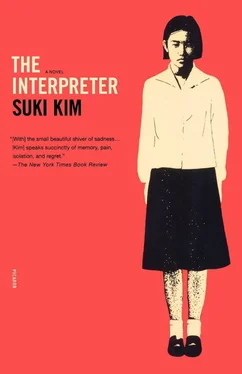It had to have been only one thing. Boys. Dad must have found Grace with one of her leather-clad boys. He must finally have stumbled upon the truth. He must have dragged her out of wherever with the fury of a father betrayed. On the surface, Grace had the markings of the perfect daughter. She had just been named the valedictorian. She was off to college on full scholarship. Even Dad was left with not many grounds on which to vent his anger. So he did one thing that defied all words. He took away her hair. Her iridescently black, luscious, seventeen-year-old hair.
Grace never sneaked out afterward. A point had been made, it seemed. What that point was, Suzy never knew. Suzy never asked what really happened that night. It is hard to fathom now why she didn’t. Ironically, Grace looked even more radiant with her newly cropped hair. A girl monk. An odd transformation. She would sometimes brush her fingers across her bare neck while reading. She seemed freer somehow. She seemed ready now to go out into the world. Dad had done her a favor. For whatever it was worth, she managed to fool him until the end.
Later, when Suzy heard about Grace taking on the job as an ESL teacher, she recalled the rage in Grace’s voice on that night many years ago. English as a second language. Fort Lee High School, whose student body was over 30 percent Korean. Exactly what Dad would have despised. The pursuit of English. The job of rescuing kids whose Korean language got them nowhere. The mission of spreading English into all those newly arrived Korean minds. Grace was still trekking their parents’ wishes, but in the opposite way, in the only way that would hurt them. Only Suzy knew this, of course. Only Suzy could tell that Grace was not okay. Only Suzy suspected that whatever Grace sought in Jesus had nothing to do with God.
No one would have guessed that Grace would go off to a New England college only to get hooked on the Bible. The whole thing seemed strange, almost spiteful. Yet church was what Grace chose, with shockingly fervent enthusiasm. Jesus Christ—the impostor whom Dad had always rejected as the antithesis of everything Korean, the source of what threatened to destroy Korea’s five-thousand-year-old history, the Western conspiracy to colonize Asia and its Buddha and Confucius. Grace picked Jesus, while Suzy threw herself at Damian, the white man, the older married man, the one she was not supposed to love. But Suzy had assumed that Grace would be smarter. She had always believed that Grace would be freer of their parents.
During one Christmas break, Grace came home and read the Bible for four straight days. It was the first time Suzy had seen her since they both went off to college. Suzy assumed that Grace’s Bible-reading was for a paper she had to write. After all, Grace’s major was religion. The only time Grace left the house was to attend Christmas Eve services. Dad didn’t mind, surprisingly. He even suggested that Suzy go as well. He said that, now that they were both of age, college girls, a church was as good a place as any for finding decent Korean boys. He believed that most Koreans, like him, attended church for convenience, for getting work tips or finding someone to marry. He told Mom to iron the finest silk dresses for both girls, which were not only too fancy but also inappropriate for December. But Grace obliged without as much as a grumble. When they arrived at the Union Pacific Church on Queens Boulevard, Grace reached over and held Suzy’s hand, which surprised Suzy. Through the entire service, Grace sat staring elsewhere. She did not seem to be listening to the sermon or the chorus of hymns. Suzy noticed that at one point, while the pastor was speaking, Grace ripped a page from the Bible and folded it over the gum she was chewing. It seemed almost purposeful, as if she wanted Suzy to witness her, as if she wanted to tell Suzy something. Suzy could not take her eyes off the Bible with the missing page, which Grace put back neatly on the shelf as the service came to an end.
On the way home, Grace remained quiet. She looked sad, Suzy thought. And thin. She had never looked thinner. Her eating habit must have gotten worse at Smith. With her bob that came down half an inch below her ear, which accentuated her sharp cheekbones, and her pale face even paler against her dark-red lips, she looked intensely angular, and yet somehow hauntingly elegant. Then, as they were nearing the house, Grace turned to Suzy and said in a clear, bright voice, “One day, if you find yourself alone, will you remember that I am too? Because you and I, we’re like twins.”
That was it. Grace never opened up to her again. But for the first time in years, they had held hands like sisters. Grace seemed almost concerned for Suzy, almost afraid. What did she mean? Why twins? Could that be why she hadn’t been able to stand Suzy all along? Because Suzy was the most exact reminder of home? The next time she saw Grace was at the funeral, and it was clear that nothing would ever bring them together again. Or at least that was what Grace indicated.
Strange that all of this should come rushing right now, here on the stoop of Maria Sutpen’s house, the last place her parents had called home. Still no Grace, no parents. So many afternoons, she had sat like this alone waiting for them. She would be done with homework by then. She knew no one in the neighborhood, always the new girl on the block. Sometimes she wished that she were an avid reader like her sister. She wished her parents would buy a new TV to replace the one with the constant buzzing noise. Even the chores would be done in no time. She was a master at rinsing rice. She’d learned how to vacuum the entire floor in less than ten minutes. Still no one came home. It would be hours before anyone came home. She was good at waiting. She was the obedient one. She stood and watched as Grace’s hair fell to the ground. She played mute while Grace became the designated interpreter. She hid in a corner while Grace got thinner and thinner. She never even wandered off until later, much later, when she could no longer stay.
Looking around, she finds it odd that the block should be so empty, even for a Friday afternoon. The whole world seems to have disappeared to give her this time, to leave her just once more with her parents.
Five years, it has taken her five years to bring herself here. After the funeral, after their ashes were scattered across the Atlantic, Suzy kept imagining her parents’ last home. But she could never picture them in such a cookie-cutter brownstone in Woodside. No Flushing, no Jersey City, never the Bronx. In her dream, she wanted to get them out of those immigrant neighborhoods. In her dream, she wanted to rewind their immigrant trekking. So she made up their pastel Montauk house. A shiny Jeep rather than the used Oldsmobile. Sunbathing and fishing instead of peeling-cutting-stocking fruit. TV before bed, like all other aging couples. Nightline, Late Night, the Tonight Show. Thanksgiving dinners. A game of Monopoly. For years, she has stayed away from this house. She has been afraid of shattering their last chance for life.
But a dream remains a dream always. Nothing alters the fact that she never got to see them again. She never held Mom’s hands and asked why irises brought a smile to her face. She never let Dad explain what made him leave Korea, why he was so tortured by his old country. She never begged them for time, just a little more time to understand. She never told them that she had to run because she could not see ahead as long as they were there. She could not embrace this place called America while they never forgot to remind her what was not Korea. She could not make sense of her American college, American friends, American lovers, while her parents toiled away twelve hours a day, seven days a week at their Bronx store. She could not become American as long as she remained their daughter. She betrayed them, so she might live.
Читать дальше












